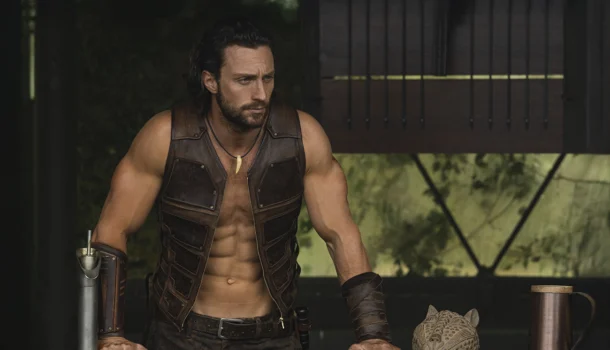There’s something anachronistic and misplaced about Sony’s insistence on building a universe of villains detached from the figure that gives them purpose. How can one assemble a hall of mirrors without the original image? “Kraven the Hunter” is yet another attempt to draw depth from a vacuum, clinging to the antihero archetype as if violence, grime, and bitterness alone could sustain dramatic weight. The film aims for intensity but stumbles by confusing ferocity with complexity, delivering a narrative that seems desperate to prove its savagery in every scene, without realizing that brutality without introspection is merely aesthetic noise.
The opening, which turns a Russian prison into a stage for performative carnage, sets the tone: Sergei Kravinoff, played by Aaron Taylor-Johnson, embodies rawness with physical vigor, but his emotional emptiness remains largely untouched. The act of killing without hesitation, followed by a cynical quip about “hunting people,” doesn’t reveal depth — only a dark affectation. Rather than leading us into the core of the character’s inner conflict, the script relies on visual shortcuts and punchlines, as if a pose could stand in for mystery. What’s missing is real drive. What’s missing is tragedy.
By resorting to flashbacks to outline its origin story, the film attempts to hint at a formative trauma. Sergei’s childhood, shaped by the tyranny of a father portrayed by Russell Crowe — in a grotesque, near-parodic performance — is meant to be the emotional engine of the plot. The hunting trip to Ghana, marked by the deranged order “have fun killing,” tries to paint Sergei’s early years in horror strokes. However, once the digital lion appears and the transformation is sealed with potion and animal blood, what might have been symbolic dissolves into dated CGI and hollow ritual. There are symbols, but no reflection on them.
J. C. Chandor attempts to blend the mystical with the urban, mixing mythology and brawls into a single narrative body. Yet the two registers clash more than they complement. The aesthetics of violence are pushed to the limit with visceral choreography, but the visual effects often waver between unfinished and laughable. The evident desire to secure an R-rated label contaminates the narrative with a vulgarity bordering on gratuitous. The guiding principle seems to be: more — more blood, more swearing, more rage. And, ironically, less depth.
Supporting characters expand the scope but fail to fulfill the promise of world-building. Dmitri, with his shapeshifting abilities, hints at the Chameleon but is underused. Aleksei undergoes an animalistic metamorphosis into a human rhinoceros but lacks soul or complexity. The Foreigner appears as a mysterious figure but vanishes after a few moments. Ariana DeBose, meanwhile, is wasted as a mysticism-deprived Calypso, reduced to a lawyer entangled in banal schemes. Everything feels sketched out: the film rehearses a prologue for a universe, but delivers characters without weight or trajectory.
Aaron Taylor-Johnson tries to make up for the misfires with an impeccable physical performance. He leaps, growls, bleeds — but the script offers him nothing more. The Kraven that emerges on screen is neither a ruthless strategist nor a man at war with his own nature. He’s merely an angry figure with no clear direction. The violence he inflicts carries no consequence, no moral reckoning. With each new fight, the story folds in on itself, as if afraid that silence might expose its lack of purpose.
Whenever the film seems poised to find its footing — leaning into family tension or the consequences of the past — it retreats. It prefers spasms to construction. Russell Crowe’s authoritarian caricature is briefly entertaining, but drains any chance of making Kraven’s father a tragic or contradictory figure. The conflicts are always external — bullets, claws, chases. What should have been a descent into the predator’s psychology becomes just another hunting montage.
In the end, “Kraven the Hunter” reveals itself as a product of hesitation: it wants to stand on its own but lives in the shadow of the absent hero. It wants to be visceral, but shies away from any reflection deeper than the surface of blood. Its aesthetic screams for impact but lacks soul. It’s a film that runs without knowing where to, and shouts without knowing what to say. If this Sony villain universe truly is nearing its end, as rumors suggest, it won’t be due to a shortage of characters — but from a failure of imagination about what to do with them.
Film: Kraven the Hunter
Director: J.C. Chandor
Year: 2024
Genres: Action/Thriller
Rating: 8/10

